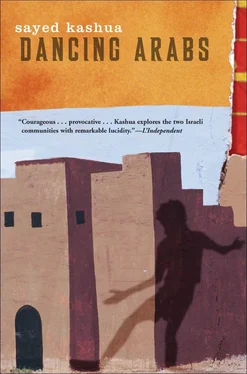I turn the dial, skipping over the Arab stations, and select the IDF channel. Then I turn up the volume till we’re out of the city. They’re burning down mosques. They’re shooting at villages and cities. People have been killed. There’s a strange pain in my joints. My arms and legs feel hollow, full of cold air, paralyzed.
I drive down the road out of Jerusalem much faster than usual. I’ve never gone at such speed with my daughter in the car. I’m afraid of crashing on the slopes. The roads don’t look any different. Every now and then, there’s the light of a passing vehicle and my eyes seek out the trucks carrying the tanks covered in heavy netting and green tarpaulin. I usually speed up once I reach the bottom of the hill, but I’m careful this time, because even the traffic police could be dangerous. That’s all I need now, for some cop to ask for my papers and find out who and what I am.
On Days When There Are Terrorist Attacks
On days when there are terrorist attacks, my wife says we’ve got to start saving. We should stop paying for cable. We could use the money to buy something new each year. Instead of watching TV we could be buying new sofas. She says what we have can hardly pass for a sofa. Besides, we need a new stove. We need a microwave oven to heat up the baby’s food. She doesn’t want expensive furniture. Even the least expensive will do. She’s seen some nice sofas at Golan Furniture in the Talpiyot neighborhood. In any case, since we move every year or two, there’s no point buying anything expensive, because the movers ruin the furniture. Last time, they broke the handle off our fridge and never managed to reassemble the cupboard.
My wife says we shouldn’t buy good things until we move into our own home in Tira. All we have there for the time being is the shell of a building, but with my parents’ help we can finish it within a year. Her father will buy the appliances. That’s how it is. The husband builds the home, and the wife buys the appliances. He bought very expensive ones for her younger sister. He’s stingy, but he feels compelled to make a good impression on strangers, like I do.
Unless I return to Tira now, my younger brother will get all my parents’ savings. He’s finished school and he’s coming back to the village. He’ll join my older brother, who got married six months ago and lives in a house of his own already, behind the one my parents live in: a spacious nice-looking house with a garden. There are two identical shells alongside it — one for me and one for my younger brother. My wife can’t understand what I like about being in Beit Safafa, when we’re surrounded by the scariest Jews — from Gilo, and the Patt neighborhood, and the Katamon projects. At least in Tira you don’t hear shooting or helicopters overhead, and they don’t disconnect the electricity every time they shell Beit Jala. She figures she’ll work in the municipality. Because she’s fed up. Every time there’s a terrorist attack, nobody at work will talk to her. She knows they need social workers in Tira. There are plenty of problems and not enough staff.
Before my younger brother got engaged, he asked if I was planning to move back home, because if not, he’d prefer to take over the shell they built for me. It could save him a lot. He wanted to get married quickly. He was engaged to a girl from Karra who went to university with him, and he was finding the distance oppressive. I told him that as far as I was concerned he could have them both, because I was never coming back.
I can’t figure out where my father got the money to build three shells. I didn’t think he had any money. He’d always complained about the cost of my tuition. He said if I’d been studying something useful he wouldn’t have minded so much, but I was just wasting my time. I started working right from my freshman year. I didn’t want to live in the dorms, and my father said if I wanted to rent an apartment I’d have to get a job.
We have to save the way your parents did, my wife says. Where do you think they got the money? Sometimes she calculates the value of the property that my parents own — the homes and the land — and says it’s worth more than a million dollars. She says I should stop being so naïve. Since my brother’s wedding, less than a year ago, they must have saved fifty thousand already. Unless I make a move, I’ll be left with nothing. My parents will never just come out and offer me some of it.
When a helicopter hovers over our home, I feel my wife has a point. Maybe it really is time to go back to Tira, to forget about Jerusalem and turn over a new leaf. If I don’t go back now, I’ll have to wait till they marry off my brother in a fully furnished home. This is my chance. My life there could be better, more focused. My wife says I don’t have anything to hide from anymore and nothing to conceal. My drinking and smoking is something my parents know about anyway. And besides, she never could understand why a married man of over twenty-five is afraid his parents will find out he smokes. It wasn’t until the day my wife gave birth that I asked my father to lend me a cigarette.
The alcohol I can hide in the cupboard, according to my wife, like my father. He drinks a lot, and there’s always a bottle of whiskey waiting in the bedroom. I don’t dare help myself, even though I’m often tempted. Once, when Grandma still had the strength, she would look for his bottles and flasks and break them outside. She’d rock the whole neighborhood with her screaming about my father and his irresponsible behavior. Wasting his money on alcohol instead of saving for his children. Who would send them to the university? Who would build them homes? She’d scream till she was red in the face, her voice almost choking. It’s all my mother’s fault, Grandma would say. She doesn’t know how to domesticate her husband. She sits around with him, glad that he drinks. She doesn’t care about the children. She spends everything on clothing and restaurants. Instead of every bottle he drinks, instead of every blouse she buys, they could be buying another chicken for the children.
Every time I enter the kitchen, I remind myself I need a lover. Even my wife knows. Since she gave birth, she says she doesn’t care anymore. As far as she’s concerned I can bring one home with me. She says Islam permits such things, something called a marriage of enjoyment.
For a few months now, my wife has been saying I can’t stand her. That’s for sure, I say. I never could stand her, but lately it’s worse than ever. She asks what’s changed, and I say nothing has changed with me; she’s the one who’s more sensitive, now that she’s a mother.
I’m looking for an Arab lover, preferably a married one, someone who’ll understand me. Someone I’ll have a lot in common with. She can be a divorcée or an unmarried woman who’s been through a lot. I’ll put an ad in the paper. How much could it cost? But I’m afraid of ugly ones or of the Arab men who may try to find out who the pervert is. She might send me a letter and a picture to my postal box, or make a date at some café, and just then one of my neighbors will happen to come in and everyone in Beit Safafa will be talking about me.
I’m a failure anyway. One night a cabdriver who took me home asked me my name, and as soon as I told him, he said, “Oh, so you’re the one who comes home drunk every night.” Lots of taxi drivers from the village work downtown at night. I can see them staring at me as I walk out of the bar, so I start taking out the garbage when I leave, even though I don’t have to. That way maybe the cabbies will think I’m working and not just wasting money.
Unfortunately, I’ve had to rule out the possibility of finding a lover in Beit Safafa itself. Sometimes when we visit Tira, my mother-in-law talks about another married woman who was caught with one of the neighbors or with a stranger. It never fails to surprise me — Arab women who cheat on their husbands. I admire them. The ending is always tragic. They always wind up being caught in one of the orchards of Tel Mond or Ramat Ha Kovesh. The orchards, el-bayarat, have always been the scene of forbidden things. I grew up on stories of people being hunted down in orchards or orange groves, of thugs setting fire there to stolen cars, of criminals being found dead or young girls found hanging from the branch of an orange or avocado tree. If it happens in Tira, it probably happens in Beit Safafa too. Except that we’re not tuned into the local scene. We’re strangers here; we don’t know the main characters in the play. There are no orchards or groves, and I’ve yet to locate the hub of the Arab criminal scene. Sometimes I think it may be at the Malcha shopping mall or at the Biblical Zoo.
Читать дальше












